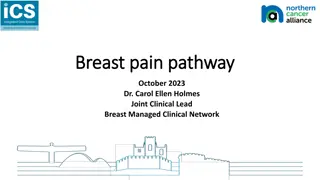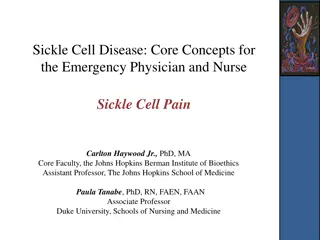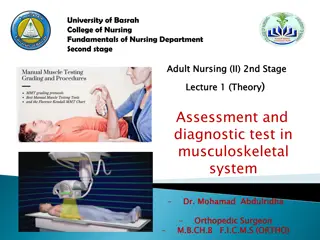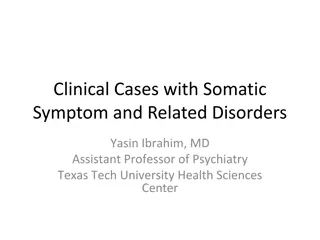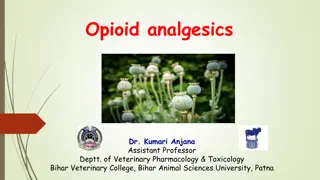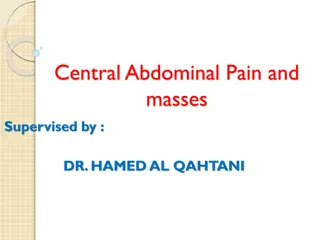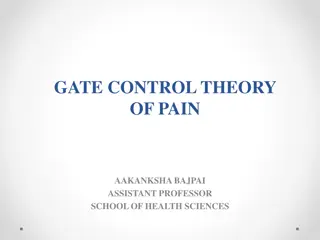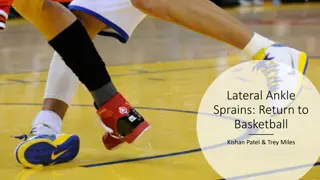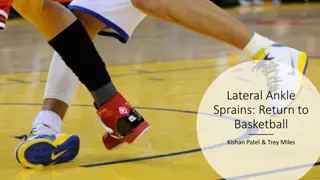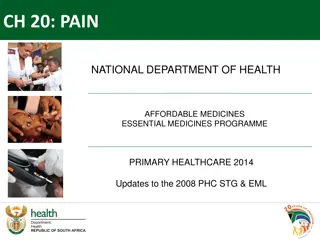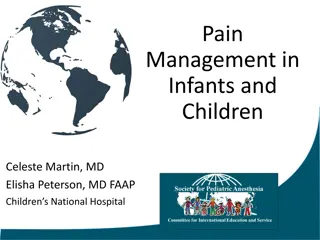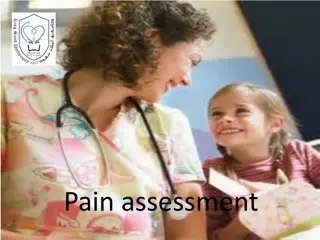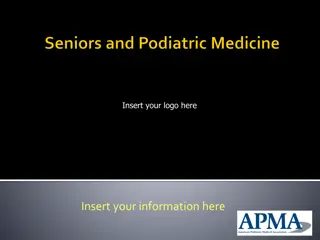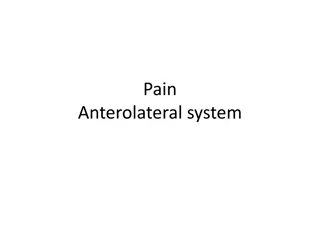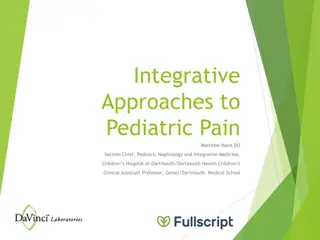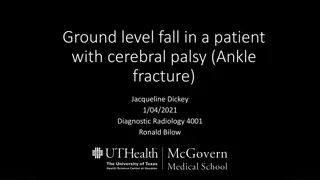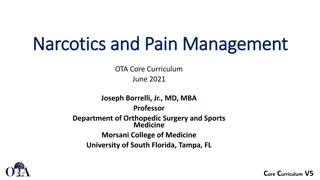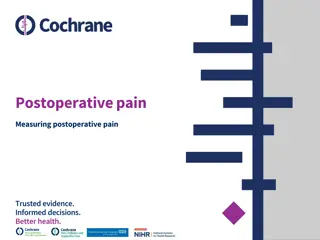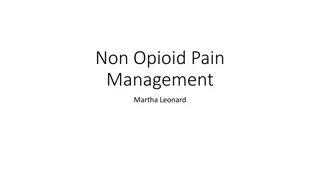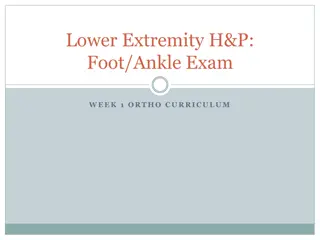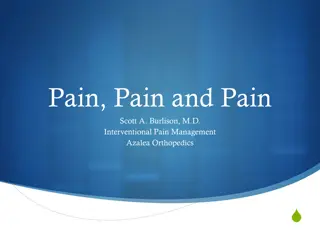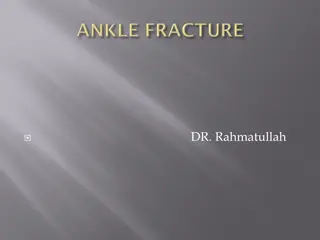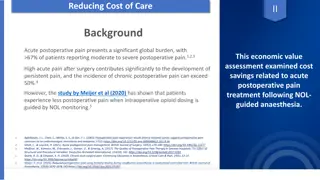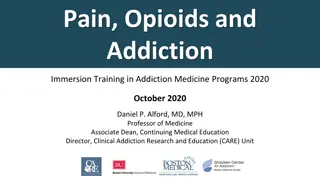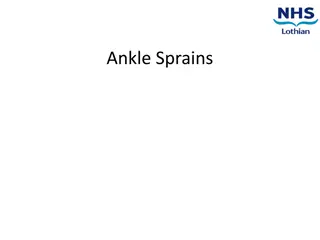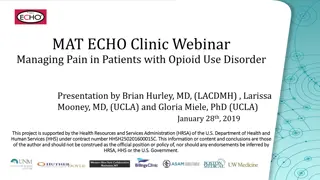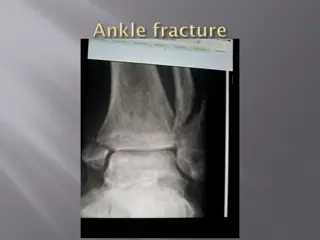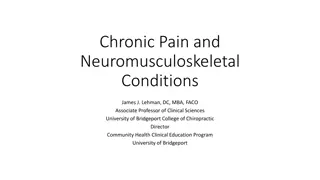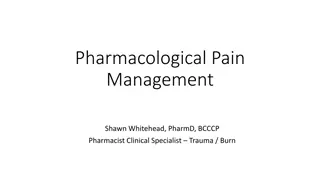Interpersonal factors and their impact on pain transitions
Exploring the impact of interpersonal factors on pain transitions, this research delves into the communication and behaviors between individuals experiencing pain, such as parent-child relationships and interactions with healthcare providers. The study analyzes psychosocial mechanisms influencing pa
3 views • 24 slides
Acute orofacial pain
Acute orofacial pain is often associated with dental issues, ranging from dentinal pain to periodontal pain. The pain can be moderate to severe, with various triggers such as mechanical stimulation and changes in osmotic pressure. This pain is prevalent in adults and can spread to different areas of
1 views • 49 slides
Understanding Breast Pain and the Breast Pain Pathway
Breast pain, characterized by tenderness, throbbing, sharp, or burning sensations in the breast tissue, can affect individuals of all genders. This common symptom may vary in severity and frequency, and is typically not associated with cancer. The Breast Pain Pathway outlines the management of breas
2 views • 13 slides
Understanding Sickle Cell Disease Pain Management
Sickle cell disease (SCD) patients often experience vaso-occlusive crises (VOC) causing acute pain, a hallmark symptom of the disease. Pain management is crucial in healthcare interactions for these patients, with chronic pain also being a significant concern due to organ/tissue damage. Research sho
1 views • 18 slides
Common Role of Pain Management for Chronic Back Pain
Discover how CT Clinic Presents is revolutionizing the approach to chronic back pain treatment through a comprehensive Pain Management program. We prioritize patient education, offering insights into the condition and its management. Our holistic approach integrates medication management, physiother
1 views • 1 slides
Assessment and Diagnostic Tests in Musculoskeletal System Pain
Pain in musculoskeletal conditions varies, such as bone pain described as dull and deep, muscular pain as soreness, fracture pain as sharp, and joint pain worsens with movement. Specific assessments by nurses include checking body alignment, joint symmetry, signs of inflammation, pressure sources, a
7 views • 38 slides
Pakistani Churidar Models - Buy Pakistani suits online
\nPakistani churidars seamlessly blend tradition with modern trends, offering a stylish choice for everyday and special occasions. Characterized by their snug fit and ankle bunching, these versatile trousers pair well with kameez, kurtas, and tunics. Popular styles include classic, embroidered, ankl
0 views • 14 slides
Do you want relief from Neck Pain in South Brisbane
Do you want relief from Neck Pain in South Brisbane? Then contact Innervate Chiro. Their dedicated practitioners combine their experience in Chiropractic, Remedial & Sports Massage for fast effective relief of Back Pain, Neck Pain, Headaches, Vertigo, Sports Injuries, shoulder, hip, nerve pain, scia
0 views • 6 slides
Get the best physiotherapy for Back Pain in Orchard
Get the best physiotherapy for Back Pain in Orchard at Physiolife Pte Ltd. Their experienced therapists provide hands-on therapy and evidence-based practice to individuals seeking personalized treatment for their pain and injuries. They specialize in technology-powered solutions like medical massage
2 views • 6 slides
Complex Case Study: Chronic Pain and Somatic Symptom Disorder
Michelle Adams, a 51-year-old hairdresser, presents with severe chronic back pain following a traumatic incident. Despite various treatments and medications, her pain persists, leading to distress and functional impairment. Her symptoms align with Somatic Symptom Disorder (SSD) with predominant pain
0 views • 50 slides
Understanding Opioid and Non-Opioid Analgesics in Pain Management
Opioid analgesics, such as morphine, act in the central nervous system to relieve pain without affecting consciousness. They differ from non-opioid analgesics like aspirin in terms of CNS depression, pain type targeted, and addiction potential. Pain is a protective mechanism caused by tissue damage
0 views • 25 slides
Understanding Central Abdominal Pain and Masses in Clinical Practice
Abdominal pain evaluation involves considering various differential diagnoses such as appendicitis, small bowel obstruction, and mesenteric ischemia. By categorizing pain as visceral, parietal, referred, or radiating, healthcare providers can better understand the underlying pathology. The history o
0 views • 57 slides
Understanding the Gate Control Theory of Pain in Pain Management
This detailed content delves into the Gate Control Theory of Pain, explaining pain pathways involving nociceptors, A-delta fibers, and C fibers. It further explores central pain pathways like the spinothalamic tract, spinomesencephalic tract, and spinoreticular tract. The theory's mechanism of pain
3 views • 11 slides
Lateral Ankle Sprains: Return to Basketball Insights
This presentation discusses the impact of lateral ankle sprains on basketball players, focusing on the need for Return to Sport (RTS) guidelines, the PAASS framework, assessment tests, prevalence, and challenges in managing these injuries in basketball. Emphasis is placed on understanding mechanisms
1 views • 16 slides
Lateral Ankle Sprains Return to Basketball Presentation
This presentation focuses on the return-to-sport guidelines for basketball players after a lateral ankle sprain. It covers the prevalence of ankle sprains in basketball, the PAASS framework for assessment, specific tests for return-to-sport decisions, common impairments, athlete perception, sensorim
6 views • 16 slides
Update on Pain Management in Primary Healthcare
The updates to the 2014 Primary Healthcare Implementation Slides focus on pain control for children, including the addition of ibuprofen and exclusion of tramadol for moderate pain. The management of acute severe pain involves retaining morphine injection while omitting metocloperamide, paracetamol,
0 views • 10 slides
Understanding Pediatric Pain Management
Explore the complexities of managing pain in infants and children, including defining pain, classifying different types of pain, understanding pain assessment tools, identifying medication classes for treatment, and recognizing special considerations. Discover insights on acute and chronic pain, neu
1 views • 40 slides
Understanding the Brain: Key Insights on Chronic Pain and EMDR Therapy
Persistent pain is often a symptom originating from the brain, not the body tissues. EMDR therapy can help reprocess maladaptive memory networks linked to chronic pain, addressing root causes including adverse childhood experiences. The AIP model emphasizes early-life factors in shaping chronic pain
0 views • 28 slides
Understanding Pain Assessment: Factors, Tools, and Relief
Pain assessment is crucial for understanding and managing patients' pain perception. This involves identifying different forms of pain, factors affecting pain sensitivity, behavioral responses to pain, and utilizing pain assessment tools for accurate evaluation. Factors influencing pain sensitivity
0 views • 18 slides
Comprehensive Podiatric Care for Foot and Ankle Health
Offering specialized care for foot and ankle conditions including bunions, hammertoes, fungal toenails, and diabetes-related issues. Providing insights on hygiene, treatments, and preventive measures. Learn about the qualifications and services of a dedicated foot and ankle specialist.
0 views • 24 slides
Understanding Pain: Mechanisms and Pathways
This content delves into the intricate mechanisms of pain perception, exploring the anterolateral system, nociceptors, endogenous analgesic systems, and more. It covers topics such as free nerve endings, VR1/Capsaicin receptors, referred pain, neuropathic pain, hyperalgesia, and visceral pain. The m
0 views • 15 slides
Ankle Injuries and Pain Overview - MD Pediatric Orthopedics
Explore the causes, types, and treatment of ankle injuries and pain, focusing on sprains, fractures, and impingement issues. Discover insights on ankle sprains in children and adults, ligament anatomy, common injury mechanisms, and essential ligaments involved. Gain valuable information on distingui
0 views • 55 slides
Sports-related Injuries and Mechanisms
This content discusses various sports-related injuries and their mechanisms, including shin splints, foot fractures, ankle sprains, and Achilles tendonitis. Each injury is described with its signs and symptoms, along with the mechanisms that caused them. The injuries range from stress fractures in t
1 views • 105 slides
Emergency Procedures for Ankle Injury During Expedition
In an emergency scenario during an expedition where a team member sustains an ankle injury, quick actions are essential. Team members need to shout for help, start first aid procedures, provide warm clothing, determine their location, contact the supervisor, call for mountain rescue if necessary, se
0 views • 14 slides
Integrative Approaches to Pediatric Pain Management: A Comprehensive Review
Pediatric pain management is a complex issue involving factors such as inflammation, neuroplasticity, and emotional responses. Dr. Matthew Hand explores integrative approaches to address common pediatric pain conditions and highlights the prevalence of chronic pain in children. The presentation delv
0 views • 39 slides
Ankle Fracture in a Patient with Cerebral Palsy: Diagnostic Radiology Case Study
A 57-year-old male with a history of cerebral palsy presented with ankle pain following a ground level fall. Examination revealed a Danis-Weber type B3 fracture subluxation and a displaced age-indeterminant fracture of the talar neck with midfoot collapse. Key imaging findings included soft tissue s
0 views • 15 slides
Understanding Pain Management in Orthopedic Surgery
Pain management in orthopedic surgery involves reviewing pain pathways, mitigating pain transmission, understanding pain medications, and implementing multi-modal pain relief strategies. Pain is a complex and subjective experience with sensory, affective, emotional, and cognitive dimensions. Factors
0 views • 51 slides
Understanding Postoperative Pain Measurement Methods
Standard methods for measuring postoperative pain include categorical, visual analogue, and numerical rating scales. Patients should self-assess their pain using these tools for accurate reporting, as demonstrated by research on pain congruence between patients and nurses. Enhancing understanding of
0 views • 16 slides
Understanding Non-Opioid Pain Management Strategies
Non-opioid pain management is crucial in the current opioid epidemic, requiring physicians to navigate chronic pain without relying on opioids. This comprehensive approach involves a deep understanding of non-opioid analgesic medications, the nature of pain, anatomy, and physiology of nociception, t
0 views • 36 slides
Lower Extremity H&P: Foot/Ankle Exam Overview
The lower extremity H&P for foot/ankle examination in orthopedic curriculum involves various steps such as general ortho physical exam maneuvers, inspection for redness and deformities, palpation of specific areas for tenderness and fractures, range of motion assessment, muscle strength testing, and
0 views • 7 slides
Understanding Pain Management: Acute vs. Chronic Pain and Interventional Therapies
Pain is a complex experience that can be acute or chronic, requiring different treatment approaches. Acute pain alerts us to potential injury, while chronic pain lasts longer and affects quality of life. Management options range from medical and psychological treatments to advanced interventions and
0 views • 26 slides
Comprehensive Overview of Ankle Fractures and Ligamentous Anatomy
Ankle fractures are more prevalent in elderly women, with isolated malleolar fractures being the most common type. Understanding the complex hinge joint and ligamentous structures of the ankle is essential for diagnosis and treatment. The syndesmotic ligament complex plays a crucial role in stabiliz
0 views • 44 slides
Cost Savings in Postoperative Pain Management with NOL-Guided Anesthesia
Acute postoperative pain is a significant issue globally, with high prevalence rates and potential long-term consequences. This economic assessment explores cost savings associated with using NOL-guided anesthesia to optimize postoperative pain treatment. By categorizing postoperative pain scores an
0 views • 4 slides
Understanding Chronic Pain, Opioids, and Addiction in Medicine
Chronic pain is a complex issue that can impact individuals on various levels. It is important to understand the subjective nature of pain and the barriers to adequate pain care. Opioid analgesics, while effective in managing pain, come with risks such as side effects, addiction, and overdose potent
0 views • 28 slides
Understanding Ankle Sprains: Causes, Symptoms, and Management
An ankle sprain is an injury to the ligaments supporting the ankle, commonly caused by twisting, sudden movements, or muscle weakness. Symptoms include pain, swelling, and restricted movement. Diagnosis involves a physical examination, and management can include self-care, medications, lifestyle cha
0 views • 12 slides
Managing Pain in Patients with Opioid Use Disorder: Strategies and Approaches
This presentation discusses essential factors to consider when treating pain in patients with Substance Use Disorder (SUD), including approaches for acute pain in those on Medication-Assisted Treatment (MAT) and non-opioid therapies for chronic pain. The information covers altered pain experiences i
0 views • 26 slides
Pediatric Ankle and Knee Pain Imaging Findings
Images show calcifications in Achilles tendon and deep to plantar fascia in a 7-year-old with ankle pain, as well as a cortical abnormality in the distal femur of a 16-year-old girl presenting with knee pain. The significance of these findings requires further evaluation by a medical professional.
0 views • 6 slides
Understanding Ankle Injuries and Treatment Options
Explore the anatomy of deltoid ligaments, fibula, medial malleolus, and posterior malleolus in ankle injuries. Learn about deformities, swelling, and bruises associated with these injuries. Discover diagnostic techniques like radiographs and Lauge-Hansen classification. Delve into non-operative and
0 views • 15 slides
Understanding Chronic Pain: A Comprehensive Overview
Chronic pain and neuromusculoskeletal conditions are prevalent health issues that require a specialized approach for accurate diagnosis and treatment. This content delves into learning objectives, national pain strategies, and the significance of addressing persistent pain as a chronic illness that
0 views • 80 slides
Comprehensive Overview of Pharmacological Pain Management Strategies
This comprehensive overview covers various aspects of pharmacological pain management, including behavioral measures for patients unable to self-report pain, building pain regimens, NSAIDs use and associated risks, NSAIDs and COX selectivity, clinical presentation of pain symptoms, gabapentinoids fo
0 views • 22 slides


